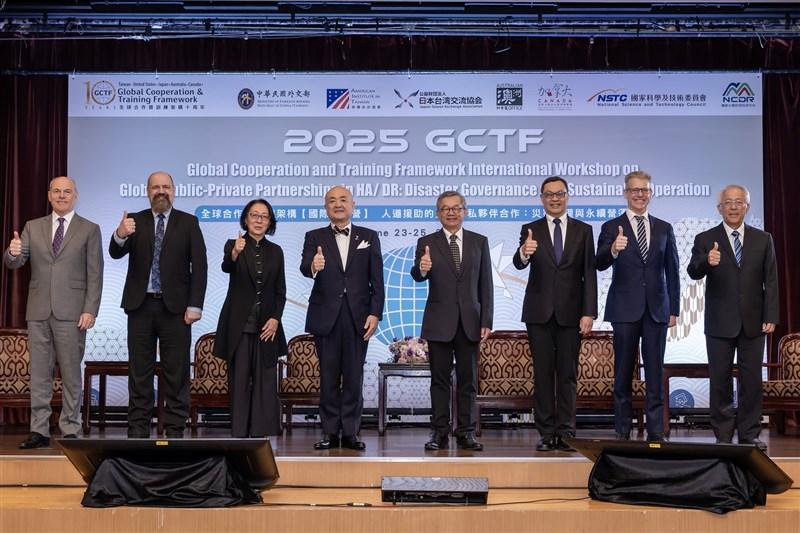A three-day international workshop on humanitarian assistance and disaster response today began in Taipei to promote cross-border partnerships, the American Institute in Taiwan (AIT) said.
Japan-Taiwan Exchange Association Chief Representative Kazuyuki Katayama and National Science and Technology Council Minister Wu Cheng-wen (吳誠文) made the opening addresses at the event hosted by the Global Cooperation and Training Framework (GCTF), AIT said.
AIT represents US interests in Taiwan in the absence of official diplomatic ties and is one of the organizers of the workshop titled "Global Public-Private Partnerships in HA/DR [humanitarian assistance/disaster response]: Disaster Governance and Sustainable Operation."

Photo courtesy of the American Institute in Taiwan via CNA
More than 150 people, including senior government officials, humanitarian aid professionals, and private-sector leaders met in Taipei, AIT said, adding that 47 of them were international participants from 34 countries and regions.
Through six thematic sessions and two panel discussions, the program would explore the role of non-governmental organizations, public-private collaboration in building disaster resilience, the application of advanced technologies such as artificial intelligence and early warning systems, and international coordination practices, it said.
After day two, participants would take a closer look at Taiwan's capabilities in disaster preparedness and coordination, with stops including the Buddhist Compassion Relief Tzu Chi Foundation for a demonstration of innovative humanitarian technologies, the National Science and Technology Center for Disaster Reduction and Taipei's Central Emergency Operation Center, AIT said.
The GCTF was launched in 2015 by Taiwan and the US as a platform that allows Taiwan to share its expertise and contribute to global issues alongside global partners, as Taipei has been sidelined from major international organizations due to Chinese pressure.
Japan, Australia and Canada joined the GCTF as full partners in 2019, 2021 and last year, respectively.
Since its launch, the GCTF has held 88 international workshops on topics such as public health, law enforcement cooperation, women's empowerment, energy efficiency, e-commerce, cybersecurity and media literacy.
More than 10,000 government officials, experts and civil society representatives from 133 countries have participated in the events, which were held in Taiwan and 17 other countries, AIT said.

Taiwan has received more than US$70 million in royalties as of the end of last year from developing the F-16V jet as countries worldwide purchase or upgrade to this popular model, government and military officials said on Saturday. Taiwan funded the development of the F-16V jet and ended up the sole investor as other countries withdrew from the program. Now the F-16V is increasingly popular and countries must pay Taiwan a percentage in royalties when they purchase new F-16V aircraft or upgrade older F-16 models. The next five years are expected to be the peak for these royalties, with Taiwan potentially earning

STAY IN YOUR LANE: As the US and Israel attack Iran, the ministry has warned China not to overstep by including Taiwanese citizens in its evacuation orders The Ministry of Foreign Affairs (MOFA) yesterday rebuked a statement by China’s embassy in Israel that it would evacuate Taiwanese holders of Chinese travel documents from Israel amid the latter’s escalating conflict with Iran. Tensions have risen across the Middle East in the wake of US and Israeli airstrikes on Iran beginning Saturday. China subsequently issued an evacuation notice for its citizens. In a news release, the Chinese embassy in Israel said holders of “Taiwan compatriot permits (台胞證)” issued to Taiwanese nationals by Chinese authorities for travel to China — could register for evacuation to Egypt. In Taipei, the ministry yesterday said Taiwan

‘LIKE-MINDED PARTNER’: Tako van Popta said it would be inappropriate to delay signing the deal with Taiwan because of China, adding he would promote the issue Canadian senators have stressed Taiwan’s importance for international trade and expressed enthusiasm for ensuring the Taiwan-Canada trade cooperation framework agreement is implemented this year. Representative to Canada Harry Tseng (曾厚仁) in an interview with the Central News Agency (CNA) said he was increasingly uneasy about Ottawa’s delays in signing the agreement, especially as Ottawa has warmed toward Beijing. There are “no negotiations left. Not only [is it] initialed, we have three versions of the text ready: English, French and Mandarin,” Tseng said. “That tells you how close we are to the final signature.” Tseng said that he hoped Canadian Prime Minister Mark Carney

POSITIVE DEVELOPMENT: Japan and the US are expected to hold in-depth discussions on Taiwan-related issues during the meeting next month, Japanese sources said The holding of a Japan-US leaders’ meeting ahead of US President Donald Trump’s visit to China is positive news for Taiwan, former Japan-Taiwan Exchange Association representative Hiroyasu Izumi said yesterday. After the Liberal Democratic Party’s landslide victory in Japan’s House of Representatives election, Japanese Prime Minister Sanae Takaichi is scheduled to visit the US next month, where she is to meet with Trump ahead of the US president’s planned visit to China from March 31 to April 2 for a meeting with Chinese President Xi Jinping (習近平). Japan and the US are expected to hold in-depth discussions on Taiwan-related issues during the